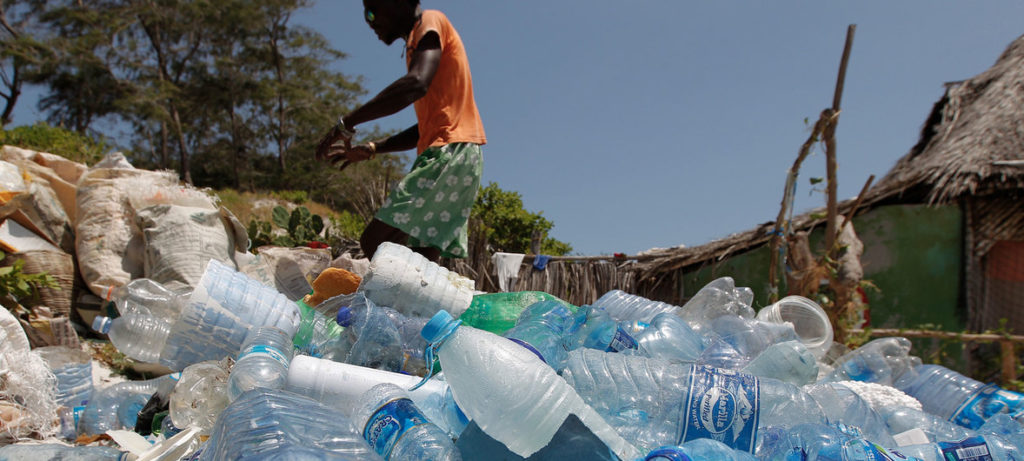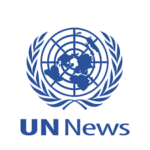UNGA President Launches New Initiative to Purge Plastics and Purify Oceans
UNITED NATIONS, ENVIRONMENT, 10 Dec 2018
UN News – TRANSCEND Media Service
The President of the UN General Assembly launched a new global call to action on Tuesday [4 Dec] to help end the scourge of plastic pollution in the ocean.
4 Dec 2018 – Maria Fernanda Espinosa told journalists at UN Headquarters in New York, that her Campaign Against Plastic Pollution – a priority during her year in office – will hold both consumers and decision-makers accountable, urging the phasing out of single-use plastics such as water bottles, and raising awareness of the impact plastic pollution has on human and environmental health.
“It is estimated that by 2050, there will be more plastic than fish in the sea. Microplastics are now confirmed in table salt, in fresh water, each person on the planet is believed to have plastic in their bodies,” she cited in her statement
“I intend to leverage the capacity of the office of the President of the General Assembly, to support ongoing global campaigns to beat plastic pollution. This will include complementary efforts by UN Environment, Global Citizen and National Geographic, amongst others.”
According to the UN’s climate agency, UN environment (UNEP), more than eight million tons of plastic ends up in the ocean annually; that’s equal to dumping one garbage truck of plastic per minute, at a cost of around $8 billion, in damage to marine ecosystems.

Local people from Watamu, Kenya, work with Local Ocean Conservation to pick up plastic on the beach.
UNEP/Cyril Villemain
The Assembly President said the campaign is comprised of two elements: global advocacy, and internal initiatives to reduce plastics use within the UN.
This is not the first time the UN has put the scourge of alarming plastic debris at the head of its priorities. In 2010 the “Greening the Blue” campaign was launched to raise awareness of the importance of sustainability throughout the UN system and encourage staff members to reduce, reuse and recycle.
“It is estimated that by 2050, there will be more plastic than fish in the sea.”
— General Assembly President
During this year’s high-level week of the General Assembly, UNEP launched the Global Plastics Platform, a network to foster commitments to reduce plastic pollution by exploring innovative designs, and methods of consumption and disposal of plastics around the world.
Last year, the agency headed up the Clean Seas campaign to urge a ban on single-use plastic, after findings revealed there were 500 times more microplastic particles littering the ocean, than there are stars in the galaxy.
Ms. Espinosa has previously pledged her commitment to the issue; specifying the environment and a ban on plastics among the seven top priorities on her agenda as Assembly President.
She announced that in Spring 2019, the initiative to stamp out plastic will be highlighted by events across the globe; including one celebrating innovative progress in New York City, a concert in the Caribbean nation of Antigua and Barbuda, and a photo exhibit at the UN General Assembly to coincide with World Environment Day.
Join us in groundbreaking plastics ban, urges PM
The Prime Minister of Antigua and Barbuda, Mr. Gaston Browne, announced that the concert was set for April 27th to coincide with Antigua ‘Sailing Week’. It will include regional and internationally renowned musicians and artists and will highlight efforts to tackle the problem globally.
He noted that Antigua and Barbuda had been successful in the elimination of single use plastics. “During the past two years, we have introduced a ban, which has worked very well…Antigua and Barbuda is the first country in the Caribbean to do so. We need to protect our oceans and we are calling on all nations to join us in banning the use of single use plastics.”
“We need to protect our oceans and we are calling on all nations to join us in banning…single use plastics.”
– Antigua and Barbuda PM, Gaston Browne
Norway’s Deputy Permanent Representative at the United Nations, Ms Mari Skåre, affirmed: “We are strong supporters of the initiative and the reason is that we have a problem with plastic pollution. Norway knows this. We know it is a health problem for the oceans and for humans. Fish eat plastic, humans eat fish”, she said.
“The good news is that we have solutions. We can solve this. This is why this global campaign is so important. If you are consumers, use your own bottle. We want to pull our weight in finding good, clean solutions for our common future.”
_________________________________________________
Related Stories:
- The world is being ‘swamped’ by harmful plastic waste says UN chief, marking Environment Day
- World must unite against ‘preventable tragedy’ of ocean pollution: UN chief
- UN-World Bank panel calls for ‘fundamental shift’ in water management
- Plastic-busting fungi may help tackle pollution, climate change: UN Environment
- Curb throw-away culture, says UN-Habitat chief, highlighting world day
DISCLAIMER: The statements, views and opinions expressed in pieces republished here are solely those of the authors and do not necessarily represent those of TMS. In accordance with title 17 U.S.C. section 107, this material is distributed without profit to those who have expressed a prior interest in receiving the included information for research and educational purposes. TMS has no affiliation whatsoever with the originator of this article nor is TMS endorsed or sponsored by the originator. “GO TO ORIGINAL” links are provided as a convenience to our readers and allow for verification of authenticity. However, as originating pages are often updated by their originating host sites, the versions posted may not match the versions our readers view when clicking the “GO TO ORIGINAL” links. This site contains copyrighted material the use of which has not always been specifically authorized by the copyright owner. We are making such material available in our efforts to advance understanding of environmental, political, human rights, economic, democracy, scientific, and social justice issues, etc. We believe this constitutes a ‘fair use’ of any such copyrighted material as provided for in section 107 of the US Copyright Law. In accordance with Title 17 U.S.C. Section 107, the material on this site is distributed without profit to those who have expressed a prior interest in receiving the included information for research and educational purposes. For more information go to: http://www.law.cornell.edu/uscode/17/107.shtml. If you wish to use copyrighted material from this site for purposes of your own that go beyond ‘fair use’, you must obtain permission from the copyright owner.
Read more
Click here to go to the current weekly digest or pick another article:
UNITED NATIONS:
- Putin’s Proposed UN Control Over Ukraine Is Well Intentioned but Will Be Tough to Implement
- The Christian Zionist Leading the International Court of Justice
- UN Special Rapporteurs on Palestine Talk Truth to Power as Trump Takes Over the US Government
ENVIRONMENT:
